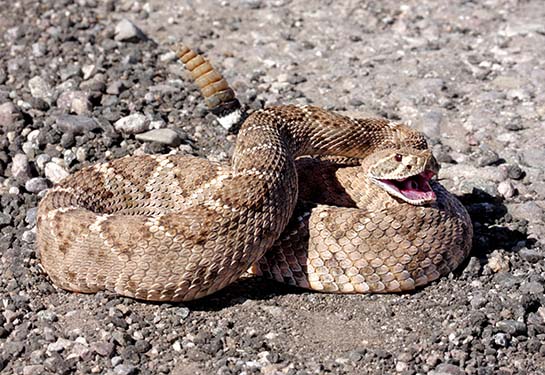Some good advice here on the snake gators.
If bitten,
DO NOT have someone try to suck out the poison. If they have so much as a single cavity in their teeth they will be poisoned as well, with the venom dangerously close to the brain. If the only person there to drive you to the hospital is also poisoned, you're both screwed.
DO: Immediately wash the area with soap and water, and keep the bite location well below the heart. Most bites are on the hands/feet, so if in the hand keep it down by the feet.
From Univ. of Cal. at Davis:
"
Do not apply ice, do not use a tourniquet or constricting band, do not try to suck out the venom, and do not use any device to cut or slice the bite site.
Constricting blood vessels near a rattlesnake bite can lead to amputation.
Wash the wound with soap and water, and remove wristwatches, rings on fingers or anything constrictive.
Keep calm, try to avoid exertion, and keep the affected extremity below heart level until you can be transported to a medical facility."
Most rattlesnake bites occur between the months of April and October. Being aware of your surroundings and knowing how to respond when encountering a rattlesnake are key to avoiding a dangerous rattlesnake bite.

health.ucdavis.edu
Best way is to avoid the snakes altogether. Watch where you are stepping, don't reach at the ground until you look. Be mindful that there are dangerous snakes around. Always better to walk around a snake, or, if you just have to detect that spot, get a long branch or stick and relocate the snake to a safe spot (for the snake).
Keep in mind that you are on their turf. Snakes, even venomous ones, are good for the environment, so only kill one if you have no other choice. JMHO.






